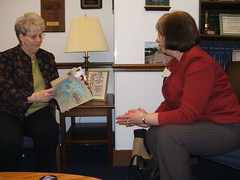She very quickly found her new skills useful and told us about it in this e-mail:
Today I had a deaf woman come into the library for the first time. She brought her granddaughter with her and wanted to get her a library card and to check out Scooby-Doo materials. The granddaughter is not hearing impaired and it was so interesting watching the two of them interact with one another. I was able to communicate with the deaf woman with my very limited ASL vocabulary on such items as establishing that she was the grandmother and not the parent of the young girl, taking the registration form to a table to fill out, the need for two pieces of identification (I used finger spelling for this as I do not know the sign for ID), and a 3 week CKO period on materials. I was able to understand some of her signing, but certainly not all of it. She knows that I am just learning to sign, so she was patient with me. I felt that it was a positive experience for both of us.About her training, Sue further stated, "A couple of items that I found interesting was that ASL is NOT a universal language, there is no universal sign language. In fact not only is it not universal, but some ASL signs are geographical as well. A sign that is used in Minnesota, may not be used in another part of the country. Also, deaf people do not view themselves as disabled or handicapped, but as whole & complete. . . Sign language is just like learning a foreign language. It takes practice, practice, practice."
Keep practicing, Sue. ECRL Assistant Director Nick Dimassis said this in an e-mail to Sue: "Congratulations, Sue, on finishing the class, putting what you've learned into practice for your patrons/community and for providing yet another set of skills from which ECRL staff can draw." And from me -- thanks for your dedication to serving your community!
Barbara Misselt, ECRL Director
